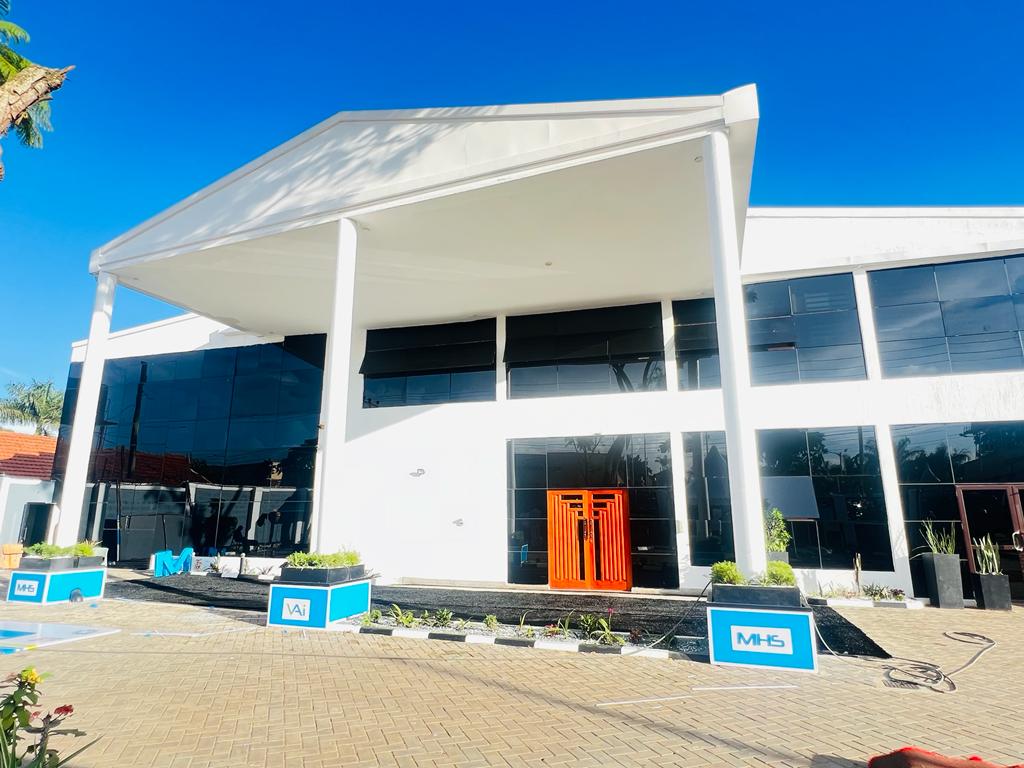Prime
Microhaem Scientifics speaks out on transparency

President Museveni cuts a ribbon to commission a diagnostic test kit manufacturing facility in Ntinda, Kampala, last week. Left is the Director of Microhaem Scientifics, Dr Cedric Akwesigye. PHOTO/ABUBAKER LUBOWA
What you need to know:
- The VAI launch by Ms Nabbanja and plant commissioning by the President at the same premises in Kampala, in addition to changing the writings in front of their main building from “VAI” to “MHS”, has made some Ugandans on social media question the transparency of the owners.
In the last 19 months, Microhaem Group of Companies hosted the Prime Minister for launching their Vaccine Access Initiative (VAI) and later the President for commissioning its manufacturing plant for diagnostic kits.
It first hosted the Prime Minister for launching their Vaccine Access Initiative (VAI) and later the President for commissioning its manufacturing plant for diagnostic kits.
During the launch of the VAI in May 2022 by Prime Minister Robinah Nabbanja, the managing director of Microhaem Scientifics (MHS), Dr Cedric Akwesigye, said besides storing vaccines and vaccinating people at the facility, they would also start making vaccines, a venture he told our reporter yesterday would be done in a manufacturing plant that would be established in Nakasongola District.
At the event in 2022, Dr Akwesigye also said they were looking at manufacturing diagnostic kits. On November 28, President Museveni at the same MHS premises in Kampala, commissioned a manufacturing plant to start making and supplying test kits for diseases like HIV and malaria.
At this event, the Health Minister, Dr Jane Ruth Aceng, applauded the MHS for establishing a test kits manufacturing plant, saying the government would buy the kits.
“The Ministry of Health and its partners will procure the test kits manufactured here, particularly for HIV and malaria. Our Central Public Health Laboratory, which has already been designated by the World Health Organisation (WHO) as a regional centre for diagnostics, will provide quality assurance services to ensure the products released into the market meet the required quality standards,” she added.
The VAI launch by Ms Nabbanja and plant commissioning by the President at the same premises in Kampala, in addition to changing the writings in front of their main building from “VAI” to “MHS”, has made some Ugandans on social media question the transparency of the owners.

Prime Minister Robinah Nabbanja (centre) commissions the Vaccine Access Initiative in Ntinda, Kampala, on May 11, 2022. On her right is Health Minister Jane Ruth Aceng. PHOTO/ Courtesy of OFFICE OF THE PRIME MINISTER
Speaking in an interview yesterday, Dr Akwesigye said there is no need for anyone to be confused. “Microhaem Group of Companies has different subsidiaries –Vaccine Access Initiative (VAI), Deseret-Microhaem Laboratories and Microhaem Laboratories. The VAI is still here, the cold room is still here, and we can still show you the cold room. This [premises in Kampala] is the headquarters and it is strictly for manufacturing of diagnostic kits,” he said.
Dr Akwesigye added: ‘‘Manufacturing of vaccines cannot happen in the city centre. It involves live viruses, which requires an isolated place in Nakasongola. ..The launch [in May 2022] was for vaccination, not vaccine manufacturing.’’
Dr Akwesigye explained that VAI, when in full operations, would deal in the general vaccine business, which he said “includes manufacturing, vaccination services and delivering vaccines as one business.”
Capacity of facility
In 2022, Dr Akwesigye said the VAI facility in Kampala has a “vaccination centre” and cold room for vaccine storage.
“The facility can store 15 million doses of vaccines, which are between 2 and 8 degrees centigrade, capacity to store 2 million doses of vaccines, which require ultra-cold storage temperatures of -60 to -90 degrees centigrade. Then 2 million doses of vaccines, which can be stored at -20 to -35 degrees centigrade,” he said on the issue of vaccine manufacturing in 2022.
Dr Akwesigye told the Prime Minister at the 2022 event: “We have gone ahead to partner with very experienced partners in the world of vaccines, pharmaceuticals and diagnostics. As we speak, we have partnered with Deseret Laboratories and we are in late discussions with Sinovac for technology transfer to foster research, development, manufacturing of vaccines in Uganda and for the region.”
“What we have here, maybe in the next six months, you will be required, we will look for you Right Honorable to come and launch a vaccine manufacturing plant. Vaccines will be manufactured from here in Uganda, we are at 70 completion of the facility, so we are headed very soon to the National Drug Authority for certification, we will apply for World Health Organisation (WHO) inspections, all this we estimate in six months we should be able to finish and the first vaccine to be manufactured will be polio [vaccine],” he added.
Current situation
In an interview yesterday, Dr Akwesigye, without mentioning whether this is a change of plans, said: “Vaccine manufacturing facility is being set up in a far place.”
“I even said earlier that we are setting vaccine manufacturing plant in Nakasongola as the President directed. There are stages of setting up a manufacturing plant –there is a feasibility study, planning and designing. That is what is going on right now on vaccine,” he added.
At the May 2022 event, Dr Aceng was also around.
She warned then that manufacturing may be delayed because it is the first time Uganda is venturing into vaccine manufacturing.
“As to whether we shall have the first vaccine manufactured in the country, depends on how fast we can have technology transfer but also how fast the scientists can do their work. But I cannot set a date,” Dr Aceng said at the time.




